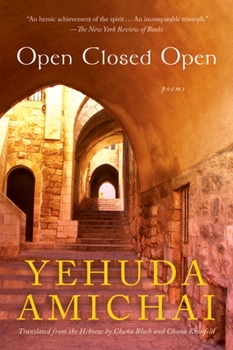Open Closed Open: Poems
Select Format
Select Condition 
Book Overview
In poems marked by tenderness and mischief, humanity and humor, Yehuda Amichai breaks open the grand diction of revered Jewish verses and casts the light of his own experience upon them. Here he tells of history, a nation, the self, love, and resurrection. Amichai's last volume is one of meditation and hope, and stands as a testament to one of Israel's greatest poets. Open closed open. Before we are born, everything is open
in...
Format:Paperback
Language:English
ISBN:0156030500
ISBN13:9780156030502
Release Date:November 2006
Publisher:Houghton Mifflin
Length:204 Pages
Weight:0.85 lbs.
Dimensions:0.6" x 5.4" x 8.0"
Customer Reviews
5 ratings
The violent or anonymous love of God for Israel? A translation mistake
Published by Thriftbooks.com User , 17 years ago
There is a translation mistake on p. 45: "God's love for His people Israel is... almost violent", should be: 'almost anonymous' (note the continuation: "on a no-name basis"), as a look at the Hebrew original shows. The words sound similar in Hebrew, and, but for a crucial different letter, are also spelled similarly. Amichai may have intended the double entendre. In this part of the poem Amichai points to the physical, embodied and impersonal use of force on the part of God in the early part of the Exodus narrative, and contrasts this with the spiritual, dis-emboded, and personal God of later Judaism. While this latter God is conventionally rated higher, Amichai finds it "hopeless' to return love to such a dis-embodied God. Love has to be embodied to be real for him.
The day-to-day Israeli poetry
Published by Thriftbooks.com User , 18 years ago
Yehuda Amichai was the greatest Israeli poet. While he does write about Jewish values, feelings, and pains, he writes as an Israeli, not only as a Jewish person. In his poetry, he intertwines subjects such as love, holocaust, the bible, and day-to-day life, in a subtle way. His metaphors are amazingly beautiful, especially due to the fact that he uses really simple vocabulary. He plays with ideas, not with words. In "Open Closed Open", I like the way he writes about bible figures as men (or women) and for a moment reminds us of their reality, not their power and superiority. I also love the comparisons he builds between orthodox and non-observant customs. IMHO, this is his best book. I have read the book both in Hebrew and in English, and this version is very well translated, even though the translator changes the order of the poems (I cannot understand the reason). If you want to learn Hebrew, he is a very good source. I know that in Israel there are several bilingual versions of his books (not this one, unfortunately). You should look for them. That's the way I did it!
The Perfect Ending
Published by Thriftbooks.com User , 23 years ago
This, the final of Yehuda Amichai's works, lays to rest a life and career memorable to no end. Open Closed Open is about the Israel that is and has been -- tensions that have not faded -- complexities that have not eroded -- and loves that remain in spite of it all. It is, in every sense, a book of poetry, of poetics unequalled. Please read Open Closed Open.
Genius
Published by Thriftbooks.com User , 24 years ago
Amichai's poetry, and especially this book, is the pristine instance of a Jewish literature. To Jews, or those interested in Jewish culture, Amichai's symbols and meditations will strike a profound chord, as he draws on Jewish culture--from Abraham to modernity--to create a comprehensive poetic representation of a people's collective conscience.However, even those with little interest in Jewish culture should be able to appreciate this work, as Amichai's commentary on the ephemerality of life, the beauty of love and the capriciousness of the world bears a profound appeal to all readers. I would recommend this book as a prime example of how beautiful modern poetry can be. Amichai takes ancient symbols and historical allusions, fits them into a uniquely modern meditation, and the result is breathtaking.
Poetry for the soul
Published by Thriftbooks.com User , 24 years ago
The English translation of Yehudah Amichai's 1998 book of poetry. This is a magnum opus. A poet would be needed to describe the genius of his words. I never "get" poetry. It doesn't work for me. But then I read a poem by Yehudah Amichai and it made sense. Then I went to hear him at a reading at NYU several years ago, and it clicked. One wants to fall in love for the sole reason that one could then use one of his poems. Then I read an excerpt from this book last Fall in "The Forward," and for the past 6 months I have been anxious for this book's release. I bought this book and I consumed it. Reading his poems is like praying, like meditating. Here is one tiny excerpt that is reprinted with permission. If it clicks for you, get the book. "Tova's brother, whom I carried wounded from the battle at Tel Gath, / recovered and was forgotten because he recovered, and died / a few years later in a car crash, and was forgotten / because he died. And even if my bloodied hands / had been prophets then, my eyes saw not / and my feet knew not what the grain in the field knows, / that green wheat ripens yellow. / That's the life prophecy of a field of wheat."





